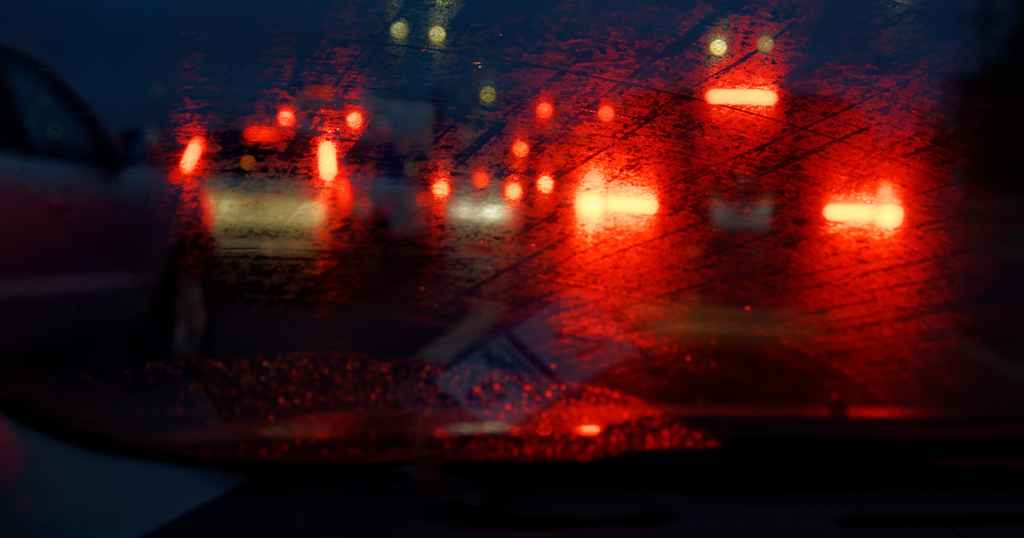
Breaking and entering struck me as such a curious phrase when I first heard it as a child, possibly because I understood braking rather than breaking and therefore imagined someone coming to a hard stop just before opening a door to enter. It was cartoonish; I could picture the smoke from the person’s heels. Charged with braking and entering? Whatever could be wrong with that? In the mix were my mother’s admonitions not to let the screen door slam, which required braking after entering, a foot or hand thrust behind to catch the door. But at the end of October, when people’s tempers had grown short due to rising coronavirus cases and a return to earlier restrictions on movement, I got an earful when, coming off the highway and entering the neighborhood where I work, I turned a corner from the main road onto a quiet street and suddenly found that my train of thought was interrupted by what lay in the street in front of me. I braked and stopped. Behind me a horn blared.
It’s true I hadn’t checked my rearview mirror before stepping on the brake. I hadn’t had a thought for other cars, just for the body in the street, a heap of feathers from where I saw it. In fact, I almost thought it was just feathers, such as might be sewn on to a woman’s stole, dropped by someone crossing the street, though the weather wasn’t yet cold enough for a stole, and it wasn’t Halloween yet. But I instinctively braked and came to a sudden stop. The object disappeared, concealed from me by the hood of the car.
The car behind me did the opposite, looming large in my mirror when I looked, alerted by that demanding honk. “What?” I thought, sitting in my car, blocking the lane, flustered and peevish. “What do you want me to do?” My reverie had been broken, and I was slow in thinking. I was not functioning. But I knew I was not going to advance and run over the thing in the road just because someone was in a hurry.
I could back up and ease out of the way to the side, but not while the other car impeded me. It was right on my tail. Where had it come from, I wondered, and at what speed, on this quiet street? Already I was shifting blame to the other driver.
Luckily for me, the other driver didn’t wait for me to figure it out but jerked the wheel to go around. So did the car behind it, leaving me alone again. I did ease my car a foot to the side, put the flashers on, scrambled for my mask and then for a plastic bag, or gloves, or even a towel I kept for drying the windshield. All I had within reach, however, was the plastic trash bag between the seats, half full. I dumped the contents onto the passenger-side floor, took a look behind me to make sure the coast was clear, and hopped out.
Poor thing. It was a large seagull, but light, more feather than flesh, as I discovered on putting the bag around it like a double-size kitchen mitt and grasping. I could tell that the creature was dead, but I couldn’t tell what had done it in—collision with a car or simply age or sickness claiming it at that time and place, on Camino del Lucero in La Calzada, just off Cuatro Caminos on a sunny Wednesday afternoon. The bird was no longer warm, but it hadn’t been there long or someone in as much of a hurry as the driver behind me would have flattened it. I lifted the body and noticed that there was no blood, though a damp spot marked the pavement. Its head hung down. Poor broken bird. But I didn’t feel sad. I never do when my first encounter with a fellow creature comes after it has died, as with figures in history books or old family portraits on the wall. This bird too was from the past. What I felt sorry for was the body I carried to the side of the road and left under a tree. What would be its fate? To be sniffed at, poked, kicked, or just stared and pointed at? Dogs and children walk by. Would they be respectful? And would whoever had to remove the bird be gentle? I could see no better spot for the body though. Certainly not the dumpster across the street.
Never for a moment did I consider dropping the remains in the dumpster. Gangsters do that, not English teachers on the way to work on a fine afternoon, sun shining, leaves fluttering, citizenry obediently masked, and the only disruptive note coming from the impatient blaring of a driver’s horn. I doubt that the person in the car behind me saw the sun, noticed the breeze, or felt the satisfaction of braking and stopping, though that person too had followed the rule: someone brakes or breaks—breaks down, cracks, comes apart—then you stop. Want to or not. Then you get to go on.

